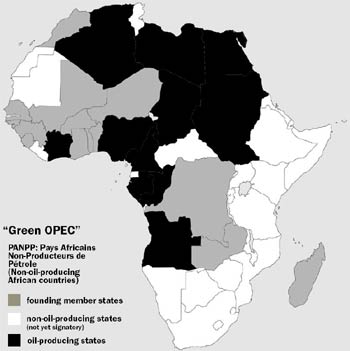
|
Africa, with its large land area and cheap labour, is an obvious target for agrofuel developers. As one European agrofuel lobby group likes to point out, just 15 African countries – nicknamed the “Green Opec” (see map) – have a combined arable land base larger than India available for agrofuel crop production.1 And already millions of hectares of the continent’s so-called “fallow” lands have been surveyed and allocated for agrofuels.
Corporations and energy-hungry countries are pouring money into Africa for agrofuel crop production, fuelling a land rush reminiscent of Europe’s initial colonial expansion. Joining the foreign invasion are Africa’s governments and business elites. Pushed to the sidelines, some groups are speaking out about the devastation all
this will cause to people’s livelihoods, but it is difficult to hear them over the clatter about Africa’s great opportunity to capitalise on the world’s energy and environmental crises.
When it comes to agrofuels, the road to Africa is paved with diplomats. A daily parade of foreign politicians stalks the continent negotiating agrofuel deals wherever possible. Europe, Japan and the US are, of course, very active, working their agrofuel interests into the various multilateral and bilateral aid, trade or investment agreements they have on the go with African countries. But the so-called emerging global powers are also busy on the continent: Brazil, largely by way of the state-owned oil company PetrobrР±s, has cut deals for ethanol imports and technology transfer with a range of African countries, from Senegal to Nigeria,
Mozambique to Angola;2 India has recently pledged US$250 million to a West African Biofuels Fund; and China has cemented a long-term cassava supply channel from Nigeria for its domestic ethanol distilleries. Add to this some trilateral agreements too, like the partnership that the UK and Brazil have formed with Mozambique.

What all of this handshaking among government people is really about is ensuring access to a steady supply of energy, both oil and agrofuels, which, of course, will be managed by the corporations.3 And things are moving quickly in this direction. Corporations are already carving out areas for agrofuel feedstock production, and existing agroindustries and plantations are being expanded.4 Early in 2007, for instance, the Tanzanian government disclosed that they were negotiating with 11 foreign companies for investment in agrofuels crop production in the country.5
Amid this flurry of foreign investment, there are losers as well as winners. Several local African entrepreneurs trying to jump on the bandwagon are struggling to make a go of it.6 The Ghanaian company Biodiesel One recently had to shut down its 12,000-hectare jatropha operation and lay off its workers because it could not find the financial backing to continue.7 The other local biodiesel company in Ghana, Anuanom Industrial Bio Products, faces similar financial problems, and its early efforts to tie up with foreign investors nearly destroyed the company.8 So both companies are pushing the government hard to bail them out. In December 2006, the government pledged about US$2 million to support large-scale jatropha cultivation in the centre of the country, with over US$300,000 going directly to Anuanom. The government also announced plans to build a paved road into the area and appealed to local chiefs and landowners to make their lands available for the project.9 Anuanom’s owner, Ghanaian industrialist Onua Amoah, has been acquiring lands for plantations in the area in partnership with 2008 presidential candidate Kwabena Frimpong-Boateng and other local elites.10
It has also been reported that the state-owned oiltrading company, BOST, has offered to purchase all the biodiesel produced in Ghana, giving the local companies a much-needed guaranteed market.11 But the smell of potential profits is drawing foreign investors into the country. UK-based D1 Oils is setting up a fully owned subsidiary, and Israeli investors have been looking into the construction of a biodiesel factory in the central region. Canadabased, A1 Biofuels and its local partner, Sahel Biofuels Development Company, based in Niger, who are preparing sites for large-scale jatropha plantations across the Sahel region of West Africa, say they plan to construct a biodiesel refinery in Ghana too, with a capacity of 25 million litres per year.
Footnotes:
-
A. Wade, “Africa Over a Barrel”, Washington Post, 28 October 2006. http://tinyurl.com/ssw8x
-
“Brazilian Company to build ethanol plant in Africa”, The Ethanol Producer. http://tinyurl.com/yuloyt
-
“Africa Forges Energy Partnership with Europe” http://tinyurl.com/yrzpkf
-
See “Cameroon: Oil palm plantations fostered by new biofuel market harm local livelihoods”, World Rainforest Movement. http://tinyurl.com/259zhn
-
The companies include Felisa (in Kigoma region); Amma (in Tanga region); Diligent Tanzania Limited (in Arusha); Procon, Diadem (in Rukwa region)
and CEPA (in Morogoro). http://tinyurl.com/ysba4k
-
For more information about biofuel projects in West Africa, see: Gbossйgnon Christophe Gandonou, “Situation des biocarburants en Afrique de
l’ouest”. www.grain.org/m/?id=131
-
http://tinyurl.com/2448ow
-
“Fraud office question Ghana Bio Diesel”, Alexander’s Gas & Oil Connections, 2 December 2004. http://tinyurl.com/ywjnwv
-
http://tinyurl.com/28t37p
-
“Wanted – an administrator for Ghana”, Hi Ghana, 7 June 2007. http://tinyurl.com/293cvh
-
“BOST agrees to buy local biodiesel”, Daily Graphic. http://tinyurl.com/2xbbe4
|
|






